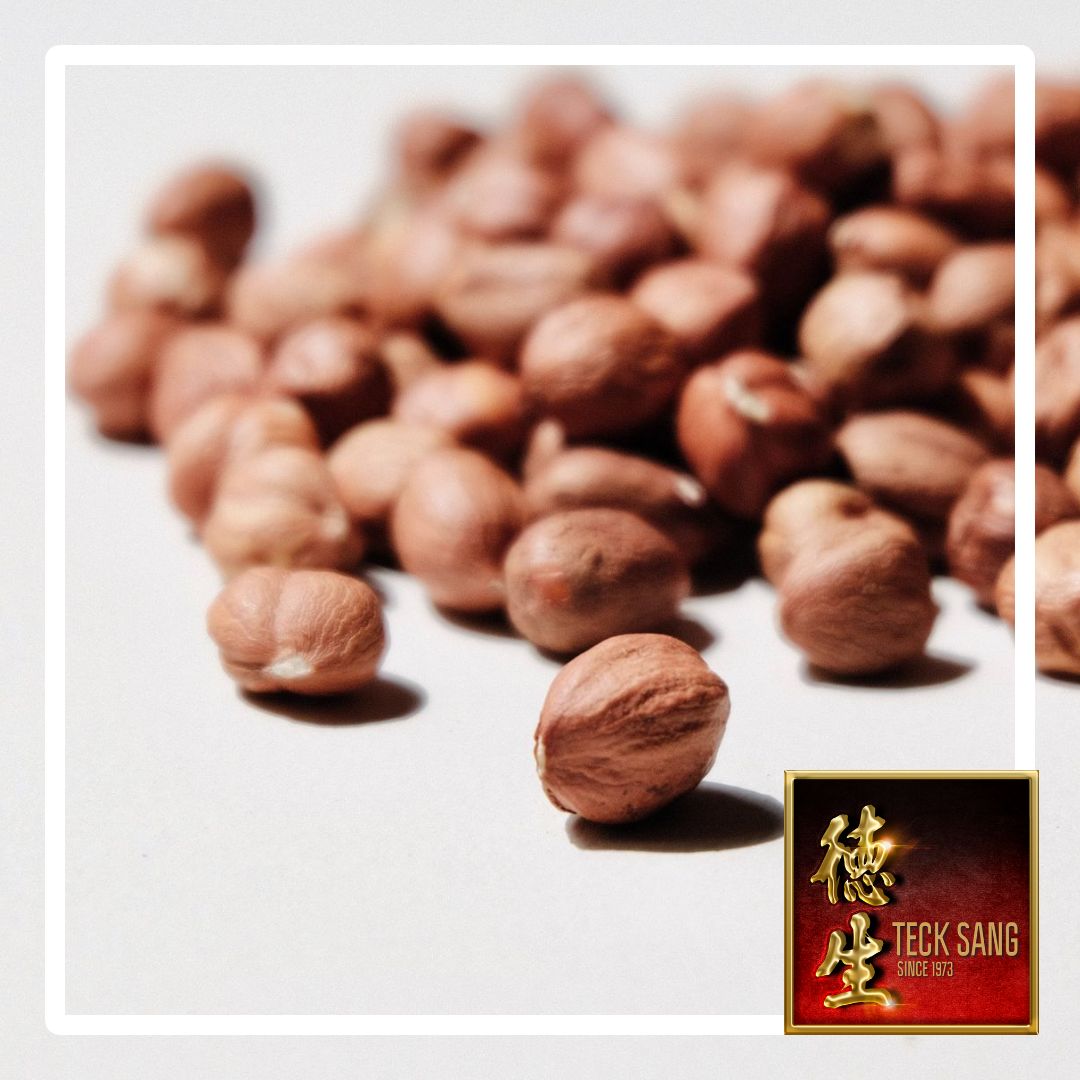The Complete Nutritional Health Benefits of Hazelnuts
Whether you're looking for an energy-boosting snack or something to add some sweetness and crunch to your favorite recipes, hazelnuts are the perfect choice! These versatile nuts have been prized since ancient times for their delicious flavor and nutritional benefits.
In this article, we'll explore the many ways you can enjoy hazelnuts in your diet, from roasted perfection to dreamy spreads. From learning about the different types of hazelnuts available to discovering tips on how to buy and store them, get ready to unveil the enchanting world of hazelnut delights!
Hazelnut Nutrition Breakdown
Hazelnuts are packed with nutritional benefits, including an extensive array of vitamins and minerals. The nutritional table below is a breakdown of 1 ounce (28grams) of raw hazelnuts - the recommended daily intake.
| Nutrient | Amount |
|---|---|
| Calories | 177 |
| Fat | 17.2 grams |
| Saturated fat | 1.2 grams |
| Monounsaturated fat | 12.7 grams |
| Polyunsaturated fat | 3.3 grams |
| Cholesterol | 0 milligrams |
| Sodium | 2 milligrams |
| Carbohydrates | 4.7 grams |
| Fiber | 2.7 grams |
| Sugars | 1.2 grams |
| Protein | 4.2 grams |
| Vitamin E | 4.2 milligrams (93% of the Daily Value) |
| Manganese | 1.7 milligrams (86% of the Daily Value) |
| Copper | 0.5 milligrams (24% of the Daily Value) |
| Thiamine | 0.2 milligrams (12% of the Daily Value) |
| Magnesium | 45.6 milligrams (11% of the Daily Value) |
| Vitamin B6 | 0.2 milligrams (8% of the Daily Value) |
Each daily serving provides about 177 calories and 17 grams of fat. Hazelnuts are a good source of healthy fats, including monounsaturated and polyunsaturated fats. These fats can help improve heart health and reduce the risk of heart disease. Hazelnuts are also a good source of fiber, protein, vitamins, and minerals.
The Nutritional Value and Health Benefits of Hazelnuts in Your Diet
Here are some of the health benefits of consuming unshelled hazelnuts:
- Reduce the risk of heart disease. Hazelnuts are a good source of monounsaturated and polyunsaturated fats, which are known to improve heart health. Studies have shown that people who eat nuts regularly have a lower risk of heart disease than those who do not eat nuts.
- Lower blood pressure. Hazelnuts may help lower blood pressure. A study published in the journal "Nutrition" found that people who ate 2 ounces of hazelnuts per day for 12 weeks had a significant decrease in blood pressure compared to those who did not eat hazelnuts.
- Reduce the risk of type 2 diabetes. Hazelnuts may help reduce the risk of type 2 diabetes. A study published in the journal "Diabetes Care" found that people who ate 2 ounces of hazelnuts per day for 12 weeks had a significant improvement in insulin sensitivity compared to those who did not eat hazelnuts.
- Protect against cancer. Hazelnuts contain antioxidants that may help protect against cancer. Studies have shown that people who eat nuts regularly have a lower risk of developing certain types of cancer, including breast cancer and prostate cancer.
- Improve brain health. Hazelnuts contain nutrients that may help improve brain health. For example, hazelnuts are a good source of vitamin E, which is an antioxidant that can help protect brain cells from damage.
- Promote weight loss. Hazelnuts are a healthy snack that can help promote weight loss. Studies have shown that people who eat nuts regularly are less likely to be overweight or obese than those who do not eat nuts.
Overall, unshelled hazelnuts are a healthy and nutritious food that can offer a variety of health benefits. They are a good source of healthy fats, fiber, protein, vitamins, and minerals. Hazelnuts can be enjoyed as a snack or added to recipes.
What are Antioxidants?
Antioxidants are substances that help protect the body's cells against damage caused by free radicals. Free radicals are highly reactive molecules that can cause oxidative stress, leading to various health problems and accelerated aging.
Hazelnuts are known to be a good source of antioxidants. They contain several types of antioxidants, including:
- Vitamin E: Hazelnuts are particularly rich in vitamin E, specifically in the form of alpha-tocopherol. Vitamin E is a fat-soluble antioxidant that helps protect cells from oxidative damage.
- Phenolic compounds: Hazelnuts contain various phenolic compounds, such as flavonoids and phenolic acids. These compounds have strong antioxidant properties and can help neutralize free radicals in the body.
- Proanthocyanidins: Hazelnuts also contain proanthocyanidins, which are a type of flavonoid. Proanthocyanidins are potent antioxidants that can scavenge free radicals and protect cells from damage.
- Carotenoids: Although in smaller amounts compared to other antioxidants in hazelnuts, they do contain carotenoids like beta-carotene and lutein. Carotenoids are known for their antioxidant properties and play a role in maintaining eye health and overall well-being.
By consuming hazelnuts, you can benefit from these natural antioxidants, which may help reduce oxidative stress and promote good health. It's worth noting that the specific antioxidant content may vary depending on factors such as the variety of hazelnuts and growing conditions.
What are the Healthy Fats in Hazelnuts?
Healthy fats, also known as unsaturated fats, are types of dietary fats that are beneficial to our health when consumed in moderation. These fats are considered healthy because they can have positive effects on our cardiovascular system, cholesterol levels, and overall well-being.
Hazelnuts are a good source of healthy fats. The types of healthy fats found in hazelnuts include:
- Monounsaturated fats: Hazelnuts are particularly rich in monounsaturated fats, specifically oleic acid. Monounsaturated fats can help improve heart health by reducing bad cholesterol (LDL) levels and increasing good cholesterol (HDL) levels.
- Polyunsaturated fats: Hazelnuts also contain polyunsaturated fats, including both omega-6 and omega-3 fatty acids. These fats are essential for our body as they play a crucial role in brain function, cell growth, and inflammation regulation.
- Omega-6 fatty acids: Hazelnuts contain omega-6 fatty acids, such as linoleic acid. While omega-6 fatty acids are essential, it's important to maintain a balanced ratio of omega-6 to omega-3 fatty acids in the diet for optimal health.
- Omega-3 fatty acids: Hazelnuts contain small amounts of omega-3 fatty acids, such as alpha-linolenic acid (ALA). Omega-3 fatty acids are known for their anti-inflammatory properties and can contribute to heart health.
Including hazelnuts as part of a balanced diet can be beneficial for obtaining these healthy fats. However, it's important to consume hazelnuts in moderation due to their calorie density. A handful of hazelnuts per day can provide you with the nutritional benefits of healthy fats without excessive calorie intake.
How does Hazelnuts manage your Blood Sugar Levels?
Hazelnuts manage your blood sugar levels by influencing insulin sensitivity while lowering your blood sugar levels.
-
High fiber content: Hazelnuts are rich in dietary fiber, including both soluble and insoluble fibers. Fiber slows down the absorption of sugars in the digestive system, which can help regulate blood sugar levels. It also promotes satiety, making you feel fuller for longer and reducing the likelihood of overeating or consuming high-sugar foods.
-
Healthy fats: Hazelnuts contain primarily healthy monounsaturated fats, which have been associated with improved insulin sensitivity and better blood sugar regulation. These fats can help stabilize blood sugar levels and reduce the risk of insulin resistance, a condition associated with type 2 diabetes.
In addition to the above, hazelnuts are also a good source of protein, vitamin E, and other nutrients that are beneficial for overall health. They can be a healthy and delicious addition to any diet, especially for people with diabetes or who are looking to improve their blood sugar control.
Why you should add Hazelnuts (Raw and Roasted) to your Diet and Recipes to try
Discover the delectable dishes you can make with hazelnuts, from savory entrées to sweet treats that will tantalize your taste buds! From homemade spreads and sauces to pastries and ice cream, here are some delicious recipes to try:
- Savory hazelnut pesto sauce
- Homemade Nutella Spread
- Chocolate-hazelnut cake
Experience the unique flavor of hazelnuts in all its glory with these easy-to-make recipes. Whether you're looking for a quick meal or an impressive dinner party dish, there's something for everyone. Each recipe is sure to delight your senses and bring joy to any gathering!
Impress your family and friends with these delicious creations made using this versatile nut. Have fun experimenting in the kitchen while creating unforgettable meals!
Tips for Buying and Storing Hazelnuts
Enjoying the flavor of hazelnuts is easy when you know how to buy and store them properly. When shopping for hazelnuts, look for ones that have a uniform color and are free from blemishes. Also, feel each nut to make sure it's not too soft or lightweight, as this could indicate it's old or has been exposed to moisture.
Once you've bought your nuts, store them in an airtight container in a cool place away from direct sunlight. For maximum freshness, you can also freeze the nuts for up to six months.
Frequently Asked Questions
How do hazelnuts compare nutritionally to other popular nuts?
Compared to other popular nuts such as almonds and walnuts, Hazelnuts are a rich source of fiber, vitamin E, and folate. They're also lower in calories and fat content than most other nuts.
What is the shelf life of hazelnut products?
Discovering the shelf life of hazelnut products can give you peace of mind when stocking up on your favorite snacks. Generally, roasted and shelled hazelnuts have a lifespan of about two months if stored in an airtight container at room temperature.
Hazelnut spreads, however, need to be kept refrigerated and last for three to four weeks.
If you're ever unsure whether your hazelnut treats are still safe to eat, use your senses - smell or taste the product first before consuming it.
Are hazelnuts suitable for people with nut allergies?
With nut allergies on the rise, it's important to know if hazelnuts are suitable for people with food sensitivities.
Unfortunately, due to their similarities in structure and composition, hazelnuts can trigger some of the same allergic responses as other tree nuts.
Therefore, anyone with a nut allergy should avoid eating hazelnuts and check product labels carefully before consuming any products made from them.
How can I incorporate hazelnuts into a vegan or vegetarian diet?
You can easily incorporate hazelnuts into a vegan or vegetarian diet as they're packed with essential vitamins, minerals, and healthy fats.
They can be ground up and used as a nut butter substitute for sandwiches, added to salads for extra crunch, or even chopped up and stirred into oatmeal or smoothies.
Hazelnuts also make an excellent topping for vegan desserts such as cakes, pies, ice cream, and more!
Try adding them to your favorite recipes for an extra boost of flavor that's sure to delight.
Are there any health risks associated with eating hazelnuts?
Eating hazelnuts can be a great source of nutrition, but it's important to know that there are some health risks associated with them.
Eating too many hazelnuts can lead to an upset stomach, nausea, and even allergies in some cases.
It's best to monitor your intake and consult a medical professional if you have any concerns about potential health risks when consuming hazelnuts.
Make sure you enjoy the deliciousness of hazelnuts in moderation!
Conclusion
You can't go wrong with hazelnuts! Whether you're looking for a healthy snack with nutritional benefits or a way to add some new flavors to your recipes, hazelnuts are an excellent choice.
With so many types and uses, there's something for everyone. Plus, they're easy to store and buy.
So next time you need a delicious treat or creative ingredient, reach for a handful of hazelnuts - you won't regret it!



